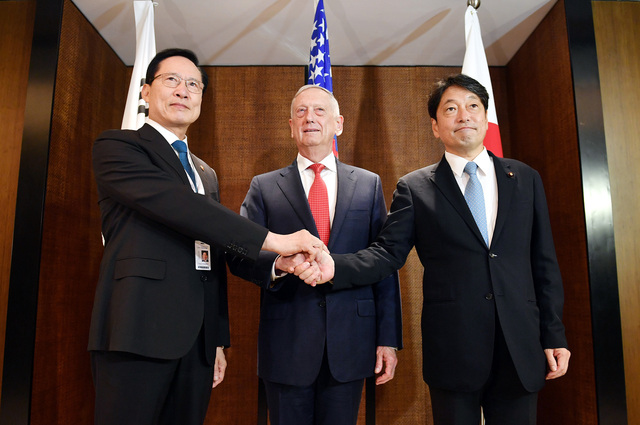 |
|
South Korean Minister of National Defense Song Young-moo, US Secretary of Defense James Mattis and Japanese Defense Minister Itsunori Onodera pose for a photograph before their trilateral defense talks in Singapore on June 3. (provided by Ministry of National Defense)
|
Two sides state intention to avoid publicizing of defense drills for summit success
South Korean and US defense ministers have agreed to maintain a “low key” military approach to support the current environment in terms of denuclearization and establishment peace on the Korean Peninsula, it was reported on June 3. “In South Korea-US defense minister talks the other day, Minister of National Defense Song Young-moo told US Secretary of Defense James Mattis, ‘We’d like to be cautious about the military area and keep it low key for the success of the North Korea-US summit,’ and Secretary Mattis said that was ‘100-percent fine,’” a South Korean Ministry of National Defense senior official reported that day. Song and Mattis had a separate bilateral meeting on June 2 after attending the Shangri-La Dialogue (Asian Security Summit) in Singapore. The discussions stood in stark contrast with the two sides’ past affirmations of a stern military response amid a growing North Korean nuclear and missile threat. The change is seen as reflecting a different situation around the Korean Peninsula with recent back-to-back inter-Korean summits and an upcoming North Korea-US summit. It remains unclear whether the “low key” approach discussed by the two defense ministers refers directly to a downscaling or suspension of military exercises. The Ministry of National Defense dismissed the possibility, saying that joint military exercises would “be conducted normally according to our annual plan” but adding that it would “refrain from publicizing them to the outside.” “Military actions have confidentiality. The general public has no way of knowing unless you make a point of telling them,” a military official said. “Exercises are an end in themselves, but they can also be announced for political purposes. [The ‘low key’ comment] means that we will be refraining from disclosing or publicizing them,” the official added. The official also waved off North Korea’s recent denunciation of the Ulchi-Freedom Guardian (UFG) exercises scheduled for August. “As far as I know, the exercises are going ahead as planned,” they said. But observers speculated that joint South Korea-US military exercises could actually end up downscaled as more progress is made in dialogue on the Korean Peninsula. In a joint press statement released after their meeting, the two ministers said they planned to cooperate on a swift return of wartime operational control (OPCON) for the South Korean military, adding that US Forces Korea (USFK) would be maintained at their current level. When asked by an audience member after his speech at the Shangri-La Dialogue that day whether a withdrawal of USFK would be possible if inter-Korean relations improve, Mattis replied, “That issue is not on the table here in Singapore on the 12th [at the North Korea-US summit] nor should it be.” Mattis stresses that issue of numbers of USFK “not on the table” for Singapore summit “I would tell you that any discussion about the number of U.S. troops in the Republic of Korea is subject to – one, the Republic of Korea's invitation to have them there and the discussions between the United States and the Republic of Korea – separate and distinct from the negotiations that are going on with DPRK,” Mattis explained. “If we can reduce the threat, if we can restore confidence-building measures with something verifiable, then of course these kinds of issues can come up subsequently between two sovereign democracies – the Republic of Korea and the United States. But that issue is not on the table here,” he added. Mattis’ clear position stood in contrast with that of US President Donald Trump, who avoided giving a direct answer on the issue the same day. After meeting with Workers’ Party of Korea vice chairman Kim Yong-chol at the White House that day, Trump was asked by a reporter whether Kim had made any demands regarding USFK. “We talked about almost everything. We talked about a lot. And we talked about sanctions,” he replied. During trilateral defense minister talks in Singapore on June 3 with Mattis and Japanese Defense Minister Itsunori Onodera, Song Young-moo said Seoul welcomed the halt to North Korea’s nuclear and ballistic missile testing and dismantlement of its Punggye Village nuclear test site. In a joint press statement, the three ministers said they “welcomed the results of the two recent inter-Korean Summits [. . .] and noted the positive changes that have been brought about are setting favorable conditions for the U.S.-North Korea Summit.” “They expressed their hopes that the upcoming U.S.-North Korea Summit will contribute to comprehensively resolving matters of security and humanitarian concerns for peace and stability on the Korean Peninsula and in the region, and to this end, pledged to strengthen security cooperation among the three countries,” the statement continued. By Park Byong-su, senior staff writer, and Kim Ji-eun, staff reporter Please direct comments or questions to [english@hani.co.kr]






